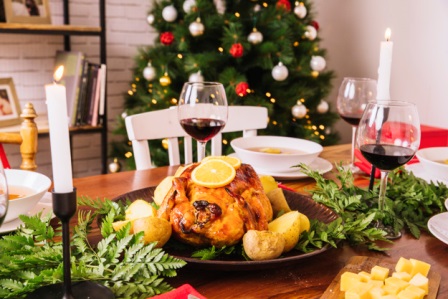Eating Elf-y at Christmas
By Dr Wendy Nicholls & Dr Tracey Devonport: Institute of Sport and Human Science.
It’s the time of year when there are treats and temptations everywhere. Huge tins of chocolates, biscuits, mince pies, and this year’s belly bursting 4.5kg giant Toblerone.
This tantalising food is readily available wherever you go; from treats in the office, to Christmas markets, meals out, and eating socially on a regular basis; Christmas can present an eating marathon. And then the crash from this party happens in January when people may regret over eating, and stare at the scales in bewilderment, not really knowing how or when it happened, but lo and behold the weight has piled on again… a diet is planned, and so the cycle goes on.
But that is not how it has to be. Researchers offer tips for healthy eating to help you end a cycle of over-eating and dieting, and mean you can enjoy Christmas without restricting what you eat or missing out. So here goes…
- Ditch the guilt. Researchers have shown that feeling guilty about eating just makes us eat even more! If you are going to eat a treat, make it worthwhile – take your time to enjoy it, notice the flavour. Sit down to eat. Enjoy the experience. Try not to eat on the go, or when you are distracted.

- Pay attention to your cravings. We know that if you crave a food, then you will think about it a lot. It is likely that you will graze on other foods to try and satisfy your craving, probably resulting in eating more than if you’d just had the craved food in the first place. The trick is to have a little bit of the food you crave. Follow the above advice about taking your time to eat it, stop feeling guilty, enjoy the food, and stop before you feel like you lose control, and before the food stops being enjoyable.
- Avoid making strict rules about your eating. When these rules are broken, people are inclined to have a ‘what the hell’ moment. This leads to more overeating, and is usually followed by plans to resume the strict rules based diet again tomorrow.
- Notice when you are full. We are not very good at noticing hunger and fullness. In fact, because we tend to eat at regular intervals, we rarely experience true hunger. Rather than tuning into your hunger and fullness, it is likely that you are more tuned in to emptying the plate, and trying every tasty morsel that is offered. Listen to your body, eat slowly; it takes a while to feel full, about 20 minutes after eating. If you see something that you desperately want to eat, it will still be there later (well, it will if you hide it from other eager eyes, can we recommend hiding in an empty cereal box?).
- If you really don’t want to miss out on a variety of foods available at a buffet or Christmas dinner, then plan your portion sizes so that you can have a little bit of everything, enjoy it, and avoid any uncomfortable bloated feeling afterwards.
- Avoid re-filling your plate. If you are going to a buffet, use a normal sized plate; a small plate will make you think that you are ‘missing out’ by having a smaller meal than usual. Fill your normal-sized plate with a meal. Eat it and wait 20 mins; enjoy the company and conversation you are keeping before returning to the buffet… if at all! If you feel the urge to eat more or try different things, follow above advice about portion sizes and keeping food to eat later.
- Deal with leftovers. You can freeze foods, donate leftovers to others who need them, or take to homeless if you really can’t resist grazing on leftovers. if you are eating food to save it from ending up in the bin… then aren’t you treating yourself a bit like a bin? Try to manage waste by planning portion size in preparing meals.
- Think about snacks as part of your eating for the whole day and adjust other meals accordingly. Sometimes when we eat we don’t really notice the food going in, or class it as a ‘snack’ and not a ‘meal’; maybe considering the hot dog at the German market to be a ‘snack’, when it has as many calories as your usual lunch. As above- notice your food, try not to eat on the go and enjoy what you eat!
- There are a lot of calories in alcohol, fruit juice, sugar laden hot chocolates, and coffees – be aware how many calories you drink as they don’t fill you up and may leave you feeling hungry or craving sugar.
Finally – and importantly, enjoy Christmas. Allow yourself to eat foods for enjoyment and to help celebrate, if feeling guilty afterwards is a concern, try to keep things within a reasonable limit.
- Dr Tracey Devonport is a Reader in Applied Sport and Exercise Psychology within the Faculty of Education, Health and Wellbeing.
- Dr Wendy Nicholls is a Senior Lecturer within the Faculty of Education, Health and Wellbeing.
For more information please contact the Corporate Communications Team.


/prod01/wlvacuk/media/departments/digital-content-and-communications/images-2024/240328-Varsity-Line-Up-Resized.jpg)
/prod01/wlvacuk/media/departments/digital-content-and-communications/images-18-19/220325-Engineers_teach_thumbail.jpg)
/prod01/wlvacuk/media/departments/digital-content-and-communications/images-2024/240404-Digital-Humanities-Training-Resized.jpg)
/prod01/wlvacuk/media/departments/digital-content-and-communications/images-2024/240320-Uzbekistan-Resized.jpg)
/prod01/wlvacuk/media/departments/digital-content-and-communications/images-2024/240229-The-Link-Resized.jpg)
/prod01/wlvacuk/media/departments/digital-content-and-communications/images-2024/240411-IYC-Resized.jpg)